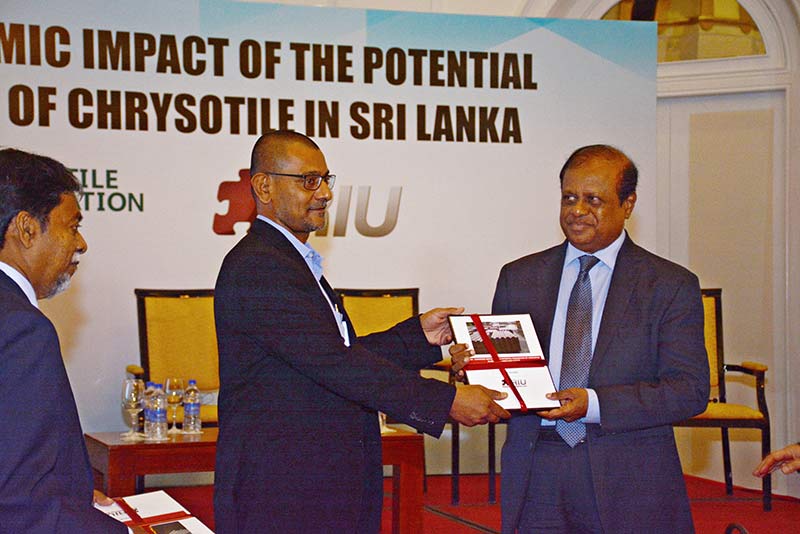
Chrysotile Information Centre and Research Intelligence Unit Present Socio Economic Impact of the Potential Ban of Chrysotile Fibre in Sri Lanka
The Chrysotile Information Centre of Sri Lanka held a seminar recently in Colombo to launch a publication on the‘Socio Economic Impact of the Potential Prohibition of Chrysotile in Sri Lanka’. The publication was based on a comprehensive, research-driven study carried out by the Research Intelligence Unit (RIU).
Commenting his views Mr. Roshan Madawala, Director of the RUI noted, “Today’s report adds a fundamental enhancement on our knowledge about the safe use of chrysotile in Sri Lanka. Our study shows that an attempt to ban will have severe macro-economic consequences, and on the individual level be felt most urgently by low income and other rural communities at risk who rely on Chrysotile fibre based roofing”
The program comprised of a presentation followed by a panel discussion incorporating renowned intellectuals, elaborating on the potentially grave impacts of a ban of chrysotile fibre cement roofing products on Sri Lanka’s economy. Several dignitaries including Minister Susil Premajayantha, Minister Eran Wickramarathne and others graced the occasion.
The Director of the Chrysotile Information Centre and co-sponsor of the study, Mr. Sunil Amawarwansa commented: “It’s essential to note that Chrysotile has been used safely in Sri Lanka for more than 50 years – proving that safe use is a reality. This stands in distinction to other forms of asbestos.”
The fact finding show that the ban of chrysotile would cause economic losses, especially to the Government, with an estimated Rs. 1.653 trillion (USD$ 11.25 billion) of unnecessary increase in economic burden on households in the entire country derived from removal, transportation and disposal of the existing Chrysotile roofing. Almost 2 million houses and buildings with chrysotile roofing materials need to be removed and pay for higher costs of substitute products, if chrysotile were to be banned.
The research report further explains that the impact on different groups of consumers include households, the business sector and the government sector as represented solely by the impact on the hospitals and schools. Over 43,000 hospital beds and 2,368 schools have been using chrysotile roofs, and thereby affecting more than millions of people and children across the island.
Social effects were mostly connected to unemployment, leading to a jobs reduction of up to 4,500 – in short time. Unfortunately, closure of plants will further increase unemployment up to 250,000. The loss of income to the direct and indirect employees in the industry will be USD$122 million per year.
The research has uncovered the gravity of the impact to be somewhere between severe and damaging under scenarios where homes will not be able to replace their roofing sheets, or upgrade from iron sheets (takaran),as they can no long afford alternative material.Clay tiles are in the frontline amongst alternatives proposed to substitute chrysotile roofing. However, the biggest drawback is the inability to increase production of clay tiles, as it requires increasing excavation of earth substantially. This would cause serious negative impacts on the environment such as landslides.
A case in point is the impact that a potential ban on chrysotile fibre imports may have on Sri Lanka’s trade relations with Russia,the world’s biggest supplier of chrysotile fibre, that are currently valued at over US$ 426 million with the balance of trade in Sri Lanka’s favour.
Since 1955, Sri Lanka has used locally produced chrysotile roofing material for home and commercial use. No specific studies, conducted internationally or locally so far, have shown disease burdens being caused by Chrysotile.
This research study has shown that Chrysotile fibre cement is a preferred choice of roofing material especially amongst Sri Lanka’s low and mid-income populations. A potential ban on Chrysotile poses adverse impacts on the national economy, even affecting householders’ affordability and quality of living conditions. Therefore, through the release and dissemination of ‘Socio Economic Impact of the Potential Prohibition of Chrysotile in Sri Lanka’ report, the Chrysotile Information Centre aims to provide invaluable references and guidance to key decision makers, authorities and stakeholders – towards making favourable decisions to support the country’s economy, while maintaining conducive environment for international trade relations.


